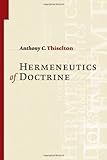Anthony Thiselton is the world’s best scholar on how to read and interpret Scripture — on the art and “science” of hermeneutics. Unfortunately, his prose falls at the opposite end of the spectrum. Now a confession: along with others, I will stand in line to buy Thiselton’s dense tomes so I can read them. Why? For no reasons other than his brilliant syntheses, his knack for bringing scholarly literature into focus, and his uncommon common sense that, like someone who can deftly tap rocks and bring forth diamonds, sheds deep light on dense subjects. But I never crack open Thiselton without knowing it will be hard work.
The Hermeneutics of Doctrine, what might be called his third volume on the process of interpretation, discusses how it is that we “do doctrine.” Completing The Two Horizons and New Horizons on Hermeneutics, this book examines both why we should study how we do doctrine (he calls this the “hermeneutics of doctrine”) and how major themes in Christian doctrine can be illuminated by watching how those doctrines have been put into words by a multitude of scholars (and he knows the literature better than anyone). Over the course of more than ten chapters, he covers the doctrines of humanity, the atonement, the work of Christ, the Holy Spirit, Trinity, ecclesiology, and eschatology.
The reason Christians need to read The Hermeneutics of Doctrine is because of Thiselton’s argument that, properly understood, doctrine involves the disposition of belief, which always includes formation and leads on to transformation. Each doctrine he examines, whether he says so with clarity or not, maps how these three terms are at work. In so doing, Thiselton reminds us that any piece of theology that does not lead to worship, absorption of God’s work on the cross of Christ, and sanctity in life in community, is not genuine theology.
What does it mean to “believe” a doctrine as true? Belief, as Thiselton has learned from H. H. Price, is an utterance that is “inextricably embodied in patterns of habit, commitment, and action, which constitute endorsement, ‘backing,’ or ‘surroundings’ for the utterance.” To “believe” is to take a stand in the face of opposition. He quotes Price: “If circumstances were to arise in which it made a practical difference whether p was true or false, he [the believer] would act as if it were true.” To believe is “performatory” in character. Thiselton puts it like this: “Belief, then, is action-orientated, situation-related, and embodied in the particularities and contingencies of everyday living.” He adds one more component, which, if he’s right, shapes everything he says and everything we believe: belief in a doctrine involves “communal commitment and communal formation.”
Here’s how I would put it: our beliefs emerge from our community, they reflect our time and our day, and they lead us to live differently. What Thiselton drills home is that all of this is what is meant in the Bible and in the Christian tradition when we use the word “belief.”
This dense summary of Thiselton’s argument implies that both Paul and James got it right, and that confessing a creed is an affirmation that we not only speak, but one we perform. Thus, belief in evangelical statements of faith today involves our entire being as we join others to look after not only what we confess, but also how we perform our confession. In fact, one of the more fascinating elements of seeing belief as disposition is that the one who believes is also one who defends a doctrine when denied. A disposition of belief involves defending one’s beliefs. Some don’t need to be told this today; many do. Belief involves “taking a stand” for someone and something and doing so with others as we, the people of God, take a stand for the gospel in a world that doesn’t embrace that gospel. But our defense is not just words; it is dispositional in that it too is performed. Orthodoxy, then, is not just something we confess when we say the Nicene Creed; orthodoxy is the disposition that we confess and live and perform in such a manner that anyone who denies what we “believe” will see our response in word and deed. We are not orthodox because we have never denied orthodoxy; we are orthodox because our disposition of belief, what we say and how we live, reveals our orthodoxy. (Thiselton’s discussion of Trinity superbly illustrates this point.)
Formation and the ensuing transformation, then, are not elements of “practical” theology to be explored once we’ve learned the “systematic” (read: impractical) theology. The focus on disposition of belief that Thiselton brings to this discussion illumines all of who we are and shapes how we live. When belief is tied to the word “disposition,” formation and transformation are at the table. Theology itself is praxis. And here’s a potent idea that emerges from Thiselton’s discussion of communally-shaped and ongoing confessions: to confess is to open oneself to be wounded. How so? Genuine confession of a creed involves the willingness for re-formation to occur at the hands of the truths of that confession. I like this: “Confessions declare a content, but they also serve to nail the speaker’s colors to the mast as an act of first-person testimony and commitment.”
A prominent feature of theological discussion today is emphasis on community. Thiselton swims in this stream, but he knows the currents that are merely faddish. Some postmodern appeals to one’s community as the foundation of one’s beliefs, he argues, are little more than wishful hopes that others will just go away. Genuine community, as Thiselton relentlessly proves in each chapter, involves commitment to listening to the whole Bible and to the voices of the Church throughout church history. Community-shaped theology is not just “my” community, but the community God formed with Abraham and that continues throughout the world to this day.
As I was reading The Hermeneutics of Doctrine a friend wrote me and said he had heard that Thiselton had died. I knew Tony had a stroke. Rosemary, his wife, wrote a short postscript to the Acknowledgments informing us that her husband “was devastated by a stroke.” So I wrote to a friend at Nottingham, where I did my doctoral work and where Thiselton now teaches, and the friend told me that Thiselton had had a remarkable recovery and was now back at work. I am grateful and, Tony, I’m standing in line for your next dense book.
Scot McKnight is Karl A. Olsson Professor in Religious Studies at North Park University.
Copyright © 2008 Christianity Today. Click for reprint information.
Related Elsewhere:
The Hermeneutics of Doctrine is available from ChristianBook.com and other retailers.
Collin Hansen’s Theology in the News column occasionally discusses books on theology.









